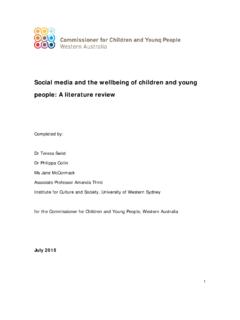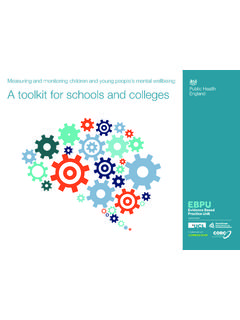Transcription of Wise Up - YoungMinds
1 Prioritising wellbeing in schoolsWise Up Alexia Adrianopoulos Philanthropist supporter of Wise UpGrowing up today seems to be harder than ever. Children and young people face a host of novel stressors that I cannot even purport to understand. In a confusing, addictive, 24-hour online world, young people need new tools and more estimated three children in every classroom suffer from a diagnosable mental health problem; I was one of them. Behind those numbers is a general trend to increased levels stress and lower levels of believe that schools are much more than centres of learning. They can and do provide the most reliable conduit to address this worrying trend, and only they can set us back on track. However, for schools to succeed in helping their students, our priorities as a nation must be realigned, and the education system must rebalance academic learning and emotional wellbeing .
2 This is what our children and young people want, it is what our teachers and school leaders want and it is what our parents want. More to the point, it is what our children and young people deserve an excellent education that prepares them academically and emotionally for the challenges they will face inside the classroom, and for the world they will enter when they is already exceptional work being done, but these efforts remain isolated and undervalued. It should be the opposite. Such work should be at the crux of our educational system and recognised at the highest level. I believe that each child deserves a dedicated place to learn to care for their own mental health, and it is our duty as a society to provide this. With schools at the helm, we can create a generation of resilient, healthy and confident individuals.
3 I hope the Wise Up campaign can take us a step in that Brennan Chief Executive, YoungMindsThe national focus on children and young people s mental health in recent years has been long overdue and welcome. The new funds government have invested in this area have generated a wealth of activity and momentum to transform our children and young people s mental health services with some no matter how much our treatment services improve they will never reach many thousands of children and young people who are unnecessarily ill and in need of mental health services. What s more, we are making matters worse with the reported experience of school stress and need education to include how to understand and look after their mental health just like we learn how to look after our physical health. By shifting the focus to preventing mental health problems and building resilience we can do so much to improve the lives of so many.
4 Good wellbeing on leaving school has a much greater impact on life outcomes than exam Wise Up we are building a movement for change to recognise that wellbeing has to be a priority for schools, and the education system needs rebalancing. Please join us, and together we can take positive steps towards building a better future for our Up Prioritising wellbeing in schoolsContentsExecutive summary 41. The crisis in our classrooms 62. The role of schools 93. Promoting wellbeing in schools 164. Recommendations 20 References 22 Acknowledgements Written by Amber Cowburn and Matt and contributions from Debbie Moss, Marc Bush, Robyn Ellison, Tom Madders and Sarah the purposes of this report, we have used the following terms in relation to these are many ways to define wellbeing , and that is a discussion in itself.
5 For this report, we define wellbeing as referenced in the widely-accepted World Health Organisation definition of mental health: Mental health is defined as a state of wellbeing in which every individual realises his or her own potential, can cope with the normal stresses of life, can work productively and fruitfully, and is able to make a contribution to her or his community. SchoolsUnder this term, we are referring to all schools and colleges, including: primary schools, secondary schools, maintained schools, free schools, academies, faith schools, further education and Up Prioritising wellbeing in schools3 Executive summaryThere is a growing mental health crisis in our schools. An estimated three children in every classroom have a diagnosable mental health problem, rising to one in four when we include emotional escalating crisisEvidence shows that across the UK, mental health issues in children are increasing while child wellbeing is deteriorating.
6 young people today have to navigate a complex and ever-changing world, facing challenges and pressures in numerous aspects of their life. In fact, 90% of school leaders have reported an increase in the number of students experiencing anxiety or stress over the last five years. Concurrently, referrals to specialist mental health services nearly doubled between 2010-11 and 2014-15. As a result, NHS Child and Adolescent Mental Health Services (CAMHS) are overwhelmed. Currently, just one in four children with a diagnosable mental health problem gets access to the treatment and care that they need. Despite improvements since Future in Mind, waiting times remain too long, and high thresholds for access to care are causing an unnecessary escalation of need. To reduce the burden on the NHS, there needs to be a greater focus on prevention through early identification and intervention.
7 The role of schoolsOver the course of their education, children spend over 7,800 hours at school. With such a huge amount of time spent in the classroom, schools provide an ideal environment for promoting good emotional wellbeing and identifying early behaviour changes and signs of mental distress. The social and emotional skills, knowledge and behaviours that young people learn in the classroom can help them to build resilience and set the pattern for how they will manage their mental health throughout their lives. Emotional wellbeing is a clear indicator of academic achievement, success and satisfaction in later life. Evidence shows that mental health and wellbeing programmes in schools, can lead to significant improvements in children s mental health, and social and emotional skills. wellbeing provision in schools can also lead to reductions in classroom misbehaviour and , despite the known benefits of good wellbeing provision, at present the education system is unbalanced.
8 There is too much emphasis on academic attainment and not enough focus on promoting the wellbeing of students. The prominence given to exams and academic attainment within the education system is having a negative impact, with 80% of young people saying that exam pressure has significantly impacted on their mental health. Over the course of their education, children spend over 7,800 hours at schoolof school leaders have reported an increase in the number of students experiencing anxiety or stress over the last five years90% 4 Wise Up Prioritising wellbeing in schoolsof young people saying that exam pressure has significantly impacted on their mental health80% Schools are often struggling to prioritise wellbeingFunding constraints, coupled with the lack of prominence given to wellbeing in legislation and the Ofsted inspection framework, mean that schools that are already having to make tough decisions about which services to cut are not incentivised to direct resource towards wellbeing are also feeling the pressure to meet pupil attainment targets and have reported feeling increasingly stressed.
9 Suffering from low levels of morale as a result. Teachers say they want to be able to promote the emotional wellbeing of their students but lack the support and skills to do so. Recommendations to GovernmentWe are calling on the Government to rebalance the education system so that the wellbeing of students is considered as important as academic encourage the Government to adopt these five key recommendations to put student wellbeing at the very heart of the education system. We believe these changes needed to ensure that all schools help their students to build resilience, look after their emotional wellbeing and go on to thrive in adulthood. 1. Update existing legislation to enshrine wellbeing as a fundamental priority of Establish mental health and wellbeing as a central part of school improvement, by strengthening the focus on wellbeing provision within the Ofsted Develop, trial and establish a wellbeing measurement framework by Embed an understanding of wellbeing , mental health and resilience in all teacher Provide schools with designated funding to resource wellbeing the education systemNew evidence from YoungMinds demonstrates overwhelming support among teachers, parents and young people for a rebalancing of the education system that gives a greater prominence to student wellbeing .
10 82% of teachers said that the focus on exams has become disproportionate to the overall wellbeing of their students 73% of parents would prefer to send their child to a school where children are generally happy, although previous exam results have not been good 81% of young people said that they would like their school or college to teach them more about how to look after their mental changes are necessary to ensure that all schools help their students to build resilience, promote emotional wellbeing and respond effectively to mental health problems5 Wise Up Prioritising wellbeing in schools1. The crisis in our classroomsWe are facing a mental health crisis in our classroomsThe growing number of children and young people experiencing poor mental health is one of the biggest challenges facing our teachers.




